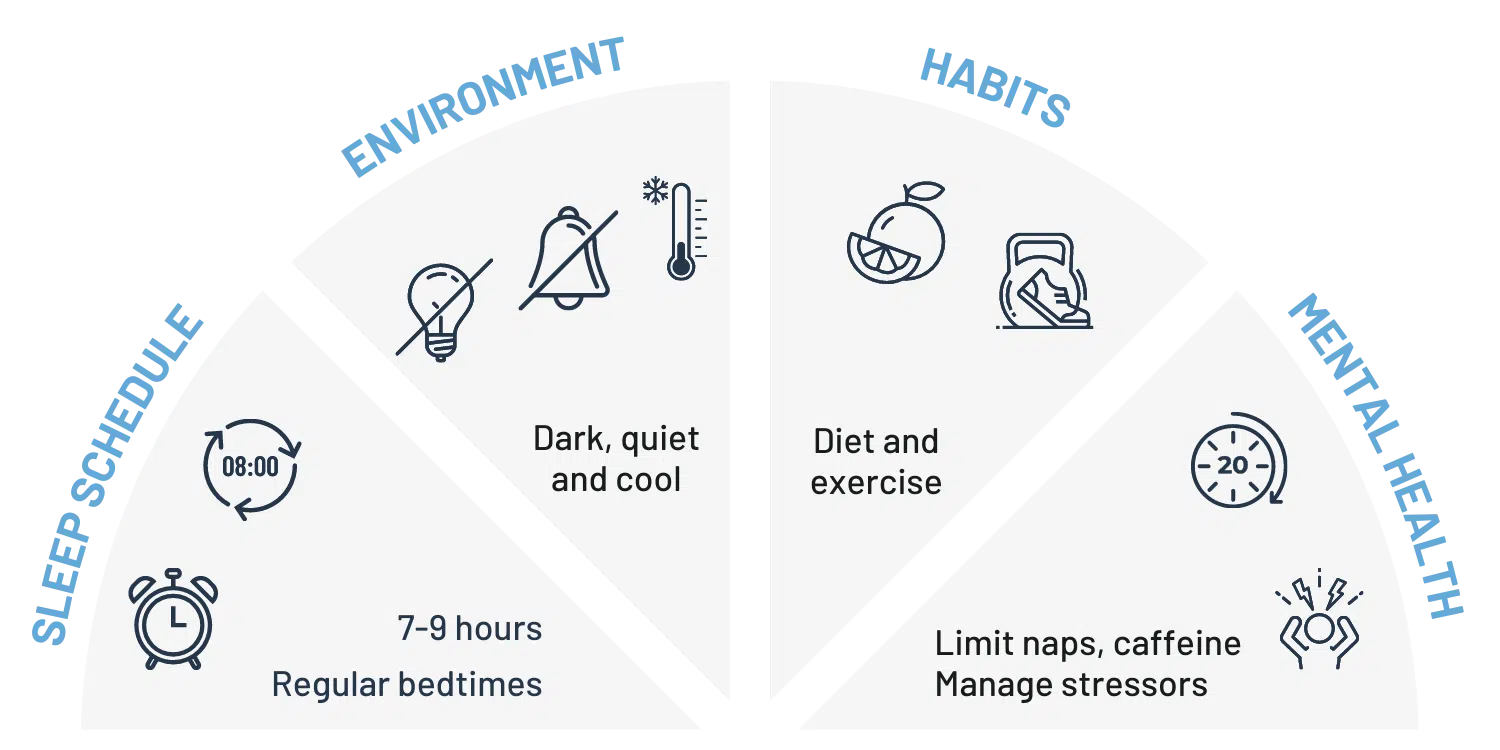
1. Stick to a schedule
Establishing a regular sleep schedule is the first step to improving the quality of your sleep. A sleep schedule involves consistent bedtimes — going to bed at the same time every night and waking up at the same time every morning. This will help to regulate your natural sleep cycle or circadian rhythm.
Try to structure your schedule so that you get a sufficient amount of sleep. Most adults require 7 to 9 hours of sleep each night in order to maintain physical and mental health. One method is to start from the time you would normally wake up and count backwards to find an ideal bedtime with enough hours of sleep.
This is not always an easy feat for those who work nights or irregular shifts. For those who fall into this category, we have 10 tips for you to read more about. If you are able to maintain a regular sleep schedule, you will find it easier to fall asleep and wake up at the right time feeling refreshed.
2. Create an ideal sleeping environment
- Keep the room dark
- Aim for a cool temperature
- Minimise noise where possible
- Keep the room free of clutter or mess
There are many quick solutions or items on the market to help facilitate a restful, calming environment. For example, a sound machine or earplugs may help with noise concerns, or an eye mask may benefit those who need to sleep during the day.For more tips on creating an ideal sleep environment, please read our guide.

3. Practice healthy habits
Regular physical activity and a balanced diet can make it easier to fall and stay asleep. However, avoid vigorous exercise close to bedtime, as it may leave you feeling too energised. Steer clear of heavy or spicy meals late at night, as they can cause discomfort or heartburn. Limit caffeine and alcohol intake, especially in the hours leading up to sleep.
4. Limit Naps
Short naps can boost your energy, but long or late naps might throw off your sleep schedule. Keep naps to about 20 minutes and avoid sleeping too close to bedtime — ideally, before 2pm or at least 8 hours before you plan to sleep.
5. Manage stress and worries
Stress and anxiety are common reasons for poor sleep. Build a calming bedtime routine to help you unwind. Try light stretching, a warm shower, or soothing music. Reduce screen time before bed, as the blue light from devices can interfere with your natural sleep signals. If you must use your phone or tablet, turn on night mode to reduce blue light exposure.

FAQs for improved sleep
If you feel sleepy but still can’t fall asleep, it might be time to adjust your bedtime routine. Focus on building healthy habits, avoid heavy meals, caffeine, and alcohol before bed, limit daytime naps, and stick to a consistent sleep schedule. It’s also helpful to reflect on anything unusual you did that might have disrupted your sleep so that you can avoid it next time.
To improve your sleep naturally, stick to a consistent sleep routine; watch what you eat, avoid going to bed feeling too hungry or too full; create a peaceful sleep environment that’s cool, dark, and quiet; stay physically active during the day; and find ways to keep your stress under control.
Start by figuring out what’s waking you—snoring from a partner, stress, noise, or other disruptions. Once you identify the cause, take steps to manage it, like using earplugs, creating a calming bedtime routine, or making your room more sleep-friendly. Solving the root issue is key to sleeping through the night.






